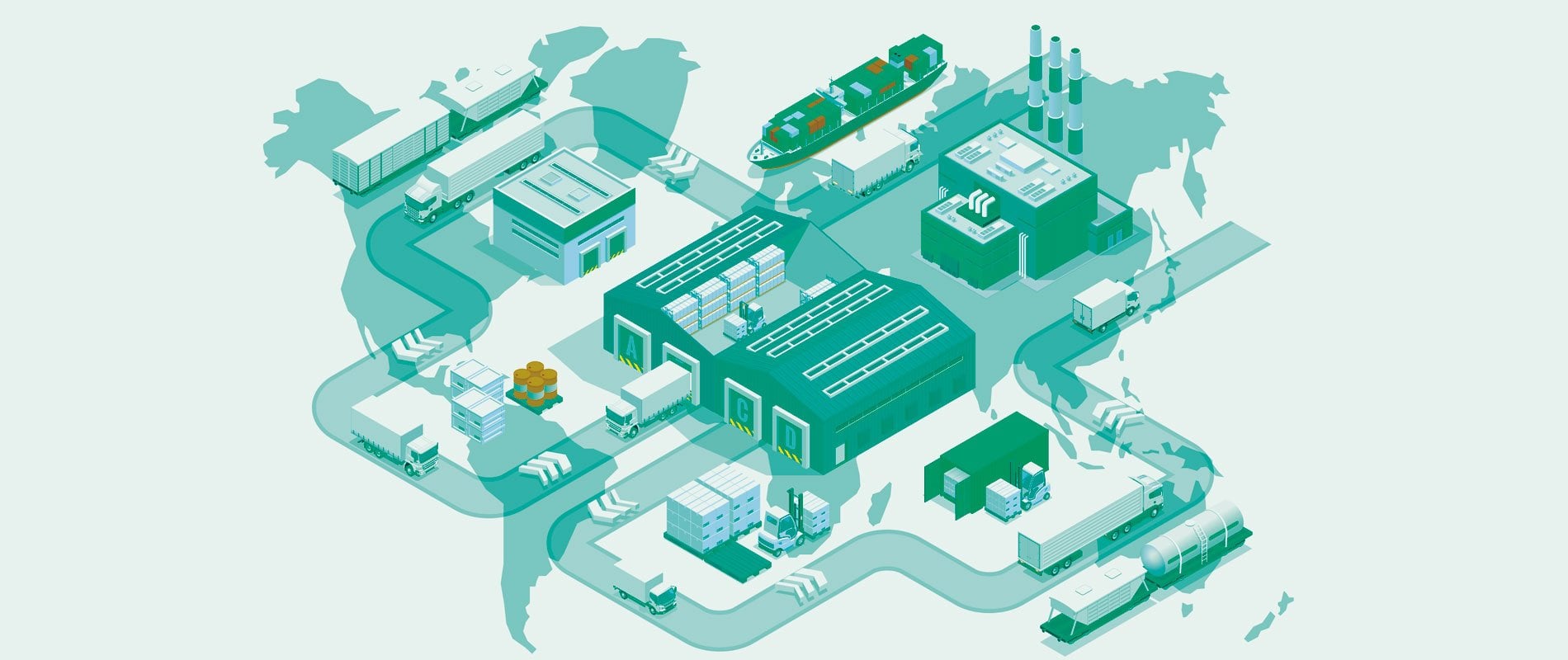Green Hub: Amnesia and supply chains: the German law that brings due diligence back into focus
Chris Vlachopoulos looks at the new "LkSG" German law that puts supply chains under scrutiny.
In Italo Calvino’s Invisible Cities, a fictionalised version of the famous 12th century merchant Marco Polo speaks with Kublai Khan about various cities along the Silk Roads. Khan is naturally curious about his vast, seemingly endless (and endlessly diverse) empire, and Marco Polo is only too keen to share stories about the various cities he has supposedly seen in his travels.
Supposedly, because the accounts Marco Polo gives aren’t always realistic: some cities float, others are impossibly extravagant. The great emperor loves listening to him regardless, because with each city he describes, Marco Polo reveals some fundamental truth – not about a specific place, but about human nature.
One of the cities Marco Polo talks about is called Euphemia, where merchants gather in the bazaar and exchange goods, the way merchants naturally would in any other city. But in Euphemia, the bemused Khan hears, those merchants don’t just exchange goods. They also tell each other stories about their experiences of how they came across those goods. They tell each other about wolves, battles, hidden treasure.
What makes Euphemia truly special, Marco Polo says, is that afterwards, when those merchants are on the long, solitary journey home, they each think about the stories they’ve heard and discover that now, their own recollections of wolves, battles and hidden treasure have changed. In Euphemia, Marco Polo tells the enchanted Khan, people don’t just exchange goods; they exchange memories.
The new German law that puts supply chains under scrutiny
Trade in today’s heavily interconnected (and real) world is immeasurably more complicated than this. Even with our straining global supply chains, we are still able to manufacture, grow, assemble, and deliver an astounding variety of goods right to our doorstep.

In fact, the intricacies of the world’s supply chains are of such staggering complexity that often artificial intelligence is utilised to manage all aspects productively and maximise efficiency. There is no time to sit around idly and exchange fanciful stories about how those products came about – not if we want those presents home in time for Christmas.
But it is also possible that by connecting the world in these new and exciting and often ingenious ways, we have also disconnected ourselves from the stories each product brings with it along its journey. Products have no memories themselves, but the humans that made them do.
And when a product comes from the other side of the world, it is not always easy to know about the conditions in which it was made – if the desire to know is there at all. Reports of any human rights and/or environmental abuses often go missing along the way, even if the products themselves are able to reach us without issues.
It is possible that a step away from that status quo may have been taken with a new German law that forces large companies to take a closer look into their supply chains. The German Act on Corporate Due Diligence Obligations for the Prevention of Human Rights Violations in Supply Chains (Lieferkettensorgfaltspflichtengesetz, “LkSG”) was adopted by the Bundestag in June 2021 and is due to come into effect on 1 January 2023.
Under the LkSG, German companies will, for the first time, be obligated to implement due diligence procedures so that they can demonstrate compliance with core human rights protections in supply chains (and, as we will see, a limited few environmental rights protections too). This not only applies to German companies, but to foreign companies that have branches in Germany as well.

It is important to note that this version of the law initially only affects companies that have 3,000 employees or more, and from 2024 onwards, that threshold will drop to 1,000 employees, significantly raising the number of companies that will fall within the scope of the law.
In essence, with the LkSG, the burden falls on German and German-registered companies to demonstrate that they have taken reasonable actions to ensure no human rights abuses take place in their own operations and in the supply chain (primarily their direct suppliers) – irrespective of sector.
Paving the way towards addressing environmental concerns
Of note here isn’t only the vast scope of the law (as it is expected to impact a substantial number of companies and their suppliers worldwide), but its potential implications for the future. It is possible that by addressing human rights abuses, the LkSG could one day pave the way towards addressing environmental concerns in supply chains as well – even as the initial focus remains on protection of human rights.
Dr. Lothar Harings, partner and head of the International Trade practice group at Graf von Westphalen, explains: “With respect to environmental concerns, the act only stipulates due diligence obligations in regard to the use of mercury and persistent organic pollutants, and aims to safeguard the prohibition of exporting or importing hazardous waste to or from certain countries.”

Dr Harings goes on to clarify that there are currently no signs that LkSG will be expanded to include further environmental provisions, including in regard to climate change. He goes on: “Taking into account recent court judgments in EU countries that oblige member states to take action against climate change, it seems questionable why climate protection has not already been included in the scope of protection. Despite this, it is more likely that Germany will wait for EU legislation on the matter of environmental due diligence obligations. The draft EU directive suggested by the EU Parliament indicates that environmental concerns may receive a stronger focus – in this case, Germany would have to amend its supply chain legislation accordingly.”
Dr. Marc Ruttloff and Prof. Dr. Eric Wagner, partners at Gleiss Lutz, agree that environmental concerns are more likely to be addressed at an EU-wide level: “This legislative development is supported by recent trends in Germany’s jurisprudence: in spring 2021, the German Federal Constitutional Court decided on the constitutionality of the Federal German Climate Protection Act in a landmark judgement, determining that, inter alia, the legislator is obliged to enact an effective climate protection law under the German constitution. From a European perspective, the global significance of climate protection could lead to substantial regulation of climate protection-related obligations, particularly at EU level.”
Birgit Schreier, salaried partner at Heuking Kühn Lüer Wojtek, comments on the wide scope of the LkSG: “We do expect that the LkSG will affect the provisions in the supply chain – with regard to the environmental risks mentioned – as the law requires the companies to impose the due diligence obligations on their contract partners. That’s why the LkSG will also affect small and medium-sized companies not exceeding the thresholds for direct application of the law. Such a transfer effect of the obligations under the law along the entire supply chain is particularly intended by the LkSG.”
Something to be taken seriously
The fact that the LkSG can have far-reaching implications for companies can be further demonstrated from the fact that certain interest groups appear to have lobbied to limit the scope of the act, while NGOs tried to expand it. In the form it was adopted, there are indications that the LkSG is something companies have to take quite seriously indeed.
Dr. Marc Ruttloff and Prof. Dr. Eric Wagner explain: “the enforcement of the LkSG is supported by the threat of severe sanctions like extensive fines and the exclusion of procurement procedures for years.”

Birgit Schreier, however, also clarifies what the limits of the LkSG are: “LkSG explicitly states that a breach of the obligations under this act does not give rise to a civil liability” and that “on a general basis the companies are only required to check their own business and their direct contractual partners for human rights risks”.
Nevertheless, Birgit Schreier also states that the LkSG’s adoption in itself is substantial: “The law has been passed and indeed sets a new standard for German companies to consider a human rights due diligence in their supply chains.”
The beginning of a conversation
The LkSG is, therefore, significant, not only for the basic human rights it helps safeguard, but also for the blueprint it may provide for the future. It is unlikely that on its own it is going to be enough, of course. One swallow does not make a summer.
But dismissing its significance is also dangerous. It might just be possible that, along with those vital, and long overdue, human rights safeguards, the LkSG’s most significant contributions could lie in helping us recognise our own capacity for change: to help us look into the ways our modern supply chains operate and realise that things we thought static and immovable don’t have to be that way.
The desire for change is there, sometimes in unexpected places. As Dr. Harings mentions: “In our current practice we see a strong commitment of companies not only to implement the minimum legal requirements, but to take the new legal act as a real chance to create a new working culture and to contribute to the improvement of the global human rights situation and environmental crisis.”
That might be the best way of viewing the LkSG in its current form: not as the final word on anything, but the beginning of a conversation that, for the longest time, we did not want to have. New memories that reach us from far away. It is not all wolves and battles in Euphemia: there’s also talk of hidden treasure.

